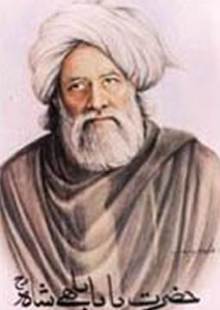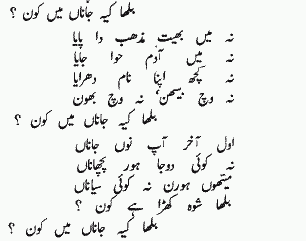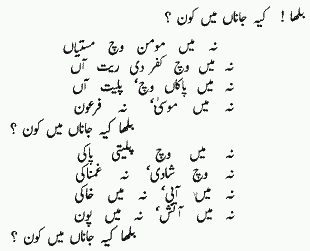Adil Najam
 A whole new generation has rediscovered Bulleh Shah. That is good.
A whole new generation has rediscovered Bulleh Shah. That is good.
Much of the credit for this rediscovery goes to the ‘sufi rock’ band Junoon and, more recently to the New Delhi singer Rabbi Shergill, and most importantly to the magnetic simplicity of ‘Bulla, ki jaanan mein koun.’ (I guess, Abida Parveen did for our generation what these guys are doing in interpreting Bulleh Shah for a new generation).
I must confess that I am a traditionalist and prefer more classical renditions of this timeless piece. My own sense, much like Deevan’s (of the blog ‘Rambling On’), is that Rabbi Shergill does a far superior job than Ali Azmat did. At least for me, Rabbi seems to ‘gets it’ more than Junoon did. But, in honesty, I am grateful to both; I also think that both should be grateful to Bulleh Shah.
So, why not judge for yourself. Here is the rendition by Rabbi Shergill. If you are new to Bulleh Shah, listen to it a couple of times before giving up on it. You can view it here by clicking on the play (arrow) button on the image below, or go to video.google.
For those who may want it, here is a version of the original and a translation by Kartar Singh Duggal:


I know not who I am
I am neither a believer going to the mosque
Nor given to non-believing ways
Neither clean, nor unclean
Neither Moses not Pharoah
I know not who I am
I am neither among sinners nor among saints
Neither happy, nor unhappy
I belong neither to water not to earth
I am neither fire, not air
I know not who I am
Neither do I know the secret of religion
Nor am I born of Adam and Eve
I have given myself no name
I belong neither to those who squat and pray
Nor to those who have gone astray
I know not who I am
I was in the beginning, I’d be there in the end
I know not any one other than the One
Who could be wiser than Bulleh Shah
Whose Master is ever there to tend?
I know not who I am.
‘Ki jaanan mein koun’ is the best known and most elegant of Bulleh Shah’s work and is itself an adaptation/translation from the works of earlier Persian philosophers. I wish that more people and singers will start looking at the rest of Bulleh Shah’s repertoire. Some have. For example, Shoaib Mansoor has already done a wonderful rendition of ‘Teray ishq nachaya kar thai-ya thai-ya’ as part of the Supreme Ishq series. And Noori has a song that seems inspired by ‘Kuttey tain-to uttay’.
If others also paid Bulleh Shah more attention, they might find that in terms of his themes Bulleh Shah may be the most contemporary poet in South Asia today. Try looking at ‘Bass kar ji’ (Enough is enough) or ‘Moun aayee baat na rehndi hai’ (I must utter what comes to my lips) and you will find them resonating with your most contemporary political and social preoccupations.
Followup post on Bulleh, Jugni, Shergill & Junoon, here.



















































Could you also please do writeups on other sufis. Waris Shah, Sultan Baho, Sachal Sarmast.
Not sure who is better but that is not a useful question. The question is about what is the magic of these words. Why do these words carry through the generations? I think because they ring true to our own struggles of existance. Bulleh Shah’s questions are still relevant. That is why he lives.
The timelessness of Bulleh Shah and other Sufi poets comes, in my opinion, from the simplicity of their words and message and also that it is a message of the ordinary person, whose challenges remain same today that were then. Good song here.
I agree that the Rabbi recording is so much more superior and also more true to the oiginal words
This is not a rediscovery or revival…. poetry of Bulleh Shah is timeless … it never dies and is always fresh….